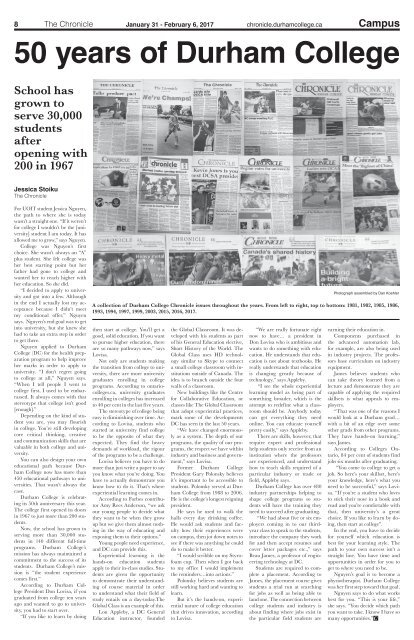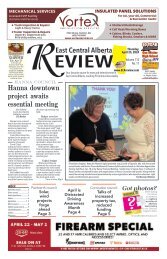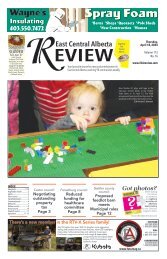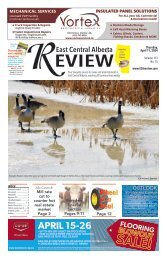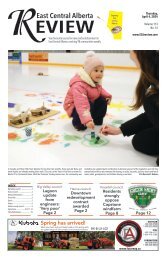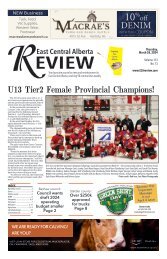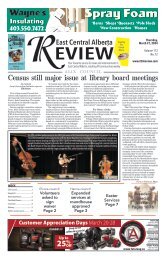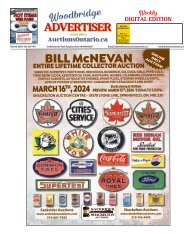Create successful ePaper yourself
Turn your PDF publications into a flip-book with our unique Google optimized e-Paper software.
8 The Chronicle January 31 - February 6, 20<strong>17</strong> chronicle.durhamcollege.ca Campus<br />
50 years of Durham College<br />
School has<br />
grown to<br />
serve 30,000<br />
students<br />
after<br />
opening with<br />
200 in 1967<br />
Jessica Stoiku<br />
The Chronicle<br />
For UOIT student Jessica Nguyen,<br />
the path to where she is today<br />
wasn’t a straight one. “If it weren’t<br />
for college I wouldn’t be the [university]<br />
student I am today. It has<br />
allowed me to grow,” says Nguyen.<br />
College was Nguyen’s first<br />
choice. She wasn’t always an “A”<br />
plus student. She felt college was<br />
her best starting point but her<br />
father had gone to college and<br />
wanted her to reach higher with<br />
her education. So she did.<br />
“I decided to apply to university<br />
and got into a few. Although<br />
in the end I actually lost my acceptance<br />
because I didn’t meet<br />
my conditional offer,” Nguyen<br />
says. Nguyen’s end goal was to get<br />
into university, but she knew she<br />
had to take an extra step in order<br />
to get there.<br />
Nguyen applied to Durham<br />
College (DC) for the health preparation<br />
program to help improve<br />
her marks in order to apply to<br />
university. “I don’t regret going<br />
to college at all,” Nguyen says.<br />
“When I tell people I went to<br />
college first, I used to be embarrassed.<br />
It always comes with that<br />
stereotype that college isn’t good<br />
[enough].”<br />
Depending on the kind of student<br />
you are, you may flourish<br />
in college. You’re still developing<br />
core critical thinking, creative<br />
and communication skills that are<br />
valuable in both college and university.<br />
You can also design your own<br />
educational path because Durham<br />
College now has more than<br />
450 educational pathways to universities.<br />
That wasn’t always the<br />
case.<br />
Durham College is celebrating<br />
its 50th anniversary this year.<br />
The college first opened its doors<br />
in 1967 to just more than 200 students.<br />
Now, the school has grown to<br />
serving more than 30,000 students<br />
in 140 different full-time<br />
programs. Durham College’s<br />
mission has always maintained a<br />
commitment to the success of its<br />
students. Durham College’s mission<br />
is “the student experience<br />
comes first.”<br />
According to Durham College<br />
President Don Lovisa, if you<br />
graduated from college ten years<br />
ago and wanted to go to university,<br />
you had to start over.<br />
“If you like to learn by doing<br />
then start at college. You’ll get a<br />
good, solid education. If you want<br />
to pursue higher education, there<br />
are so many pathways now,” says<br />
Lovisa.<br />
Not only are students making<br />
the transition from college to university,<br />
there are more university<br />
graduates enrolling in college<br />
programs. According to ontariocolleges.ca,<br />
university graduates<br />
enrolling in colleges has increased<br />
to 40 per cent in the last five years.<br />
The stereotype of college being<br />
easy is diminishing over time. According<br />
to Lovisa, students who<br />
started at university find college<br />
to be the opposite of what they<br />
expected. They find the heavy<br />
demands of workload, the rigour<br />
of the programs to be a challenge.<br />
Lovisa believes you have to do<br />
more than just write a paper to say<br />
you know what you’re doing. You<br />
have to actually demonstrate you<br />
know how to do it. That’s where<br />
experiential learning comes in.<br />
According to Forbes contributor<br />
Amy Rees Anderson, “we ask<br />
our young people to decide what<br />
they want to be when they grow<br />
up but we give them almost nothing<br />
in the way of educating and<br />
exposing them to their options.”<br />
Young people need experience,<br />
and DC can provide this.<br />
Experiential learning is the<br />
hands-on education students<br />
apply to their in-class studies. Students<br />
are given the opportunity<br />
to demonstrate their understanding<br />
of course material in order<br />
to understand what their field of<br />
study entails on a day-today.The<br />
Global Class is an example of this.<br />
Lon Appleby, a DC General<br />
Education instructor, founded<br />
the Global Classroom. It was developed<br />
with his students as part<br />
of his General Education elective,<br />
Short History of the World. The<br />
Global Class uses HD technology<br />
similar to Skype to connect<br />
a small college classroom with institutions<br />
outside of Canada. The<br />
idea is to branch outside the four<br />
walls of a classroom.<br />
New buildings like the Centre<br />
for Collaborative Education, or<br />
classes like The Global Classroom<br />
that adopt experiential practices,<br />
mark some of the developments<br />
DC has seen in the last 50 years.<br />
“We have changed enormously<br />
as a system. The depth of our<br />
programs, the quality of our programs,<br />
the respect we have within<br />
industry and business and government,”<br />
says Lovisa.<br />
Former Durham College<br />
President Gary Polonsky believes<br />
it’s important to be accessible to<br />
students. Polonsky served at Durham<br />
College from 1988 to 2006.<br />
He is the college’s longest reigning<br />
president.<br />
He says he used to walk the<br />
halls every day drinking coffee.<br />
He would ask students and faculty<br />
how their experiences were<br />
on campus, then jot down notes to<br />
see if there was anything he could<br />
do to make it better.<br />
“I would scribble on my Styrofoam<br />
cup. Then when I got back<br />
to my office I would implement<br />
the reminders…into actions.”<br />
Polonsky believes students are<br />
still working hard and wanting to<br />
learn.<br />
But it’s the hands-on, experiential<br />
nature of college education<br />
that drives innovation, according<br />
to Lovisa.<br />
“We are really fortunate right<br />
now to have… a president in<br />
Don Lovisa who is ambitious and<br />
wants to do something with education.<br />
He understands that education<br />
is not about textbooks. He<br />
really understands that education<br />
is changing greatly because of<br />
technology,” says Appleby.<br />
“I see the whole experiential<br />
learning model as being part of<br />
something broader, which is the<br />
attempt to redefine what a classroom<br />
should be. Anybody today<br />
can get everything they need<br />
online. You can educate yourself<br />
pretty easily,” says Appleby.<br />
There are skills, however, that<br />
require expert and professional<br />
help students only receive from an<br />
institution where the professors<br />
are experienced, and understand<br />
how to teach skills required of a<br />
particular industry or trade or<br />
field, Appleby says.<br />
Durham College has over 480<br />
industry partnerships helping to<br />
shape college programs so students<br />
will have the training they<br />
need to succeed after graduating.<br />
“We had about five or six employers<br />
coming in to our thirdyear<br />
class to speak to the students,<br />
introduce the company they work<br />
for and then accept resumes and<br />
cover letter packages etc.,” says<br />
Beau James, a professor of engineering<br />
technology at DC.<br />
Students are required to complete<br />
a placement. According to<br />
James, the placement course gives<br />
students a trial run at searching<br />
for jobs as well as being able to<br />
land one. The connection between<br />
college students and industry is<br />
about finding where jobs exist in<br />
the particular field students are<br />
Photograph assembled by Dan Koehler<br />
A collection of Durham College Chronicle issues throughout the years. From left to right, top to bottom: 1981, 1982, 1985, 1986,<br />
1993, 1994, 1997, 1999, 2003, 2015, 20<strong>16</strong>, 20<strong>17</strong>.<br />
earning their education in.<br />
Components purchased in<br />
the advanced automation lab,<br />
for example, are also being used<br />
in industry projects. The professors<br />
base curriculum on industry<br />
equipment.<br />
James believes students who<br />
can take theory learned from a<br />
lecture and demonstrate they are<br />
capable of applying the required<br />
skillsets is what appeals to employers.<br />
“That was one of the reasons I<br />
would look at a Durham grad…<br />
with a bit of an edge over some<br />
other grads from other programs.<br />
They have hands-on learning,”<br />
says James.<br />
According to Colleges Ontario,<br />
84 per cent of students find<br />
jobs six months after graduating.<br />
“You come to college to get a<br />
job. So here’s your skillset, here’s<br />
your knowledge, here’s what you<br />
need to be successful,” says Lovisa.<br />
“If you’re a student who loves<br />
to stick their nose in a book and<br />
read and you’re comfortable with<br />
that, then university’s a great<br />
choice. If you like to learn by doing,<br />
then start at college”.<br />
In the end, you have to decide<br />
for yourself which education is<br />
best for your learning style. The<br />
path to your own success isn’t a<br />
straight line. You have time and<br />
opportunities in order for you to<br />
get to where you need to be.<br />
Nguyen’s goal is to become a<br />
physiotherapist. Durham College<br />
was her first step toward that goal.<br />
Nguyen says to do what works<br />
best for you. “This is your life,”<br />
she says. “You decide which path<br />
you want to take. I know I have so<br />
many opportunities.”


